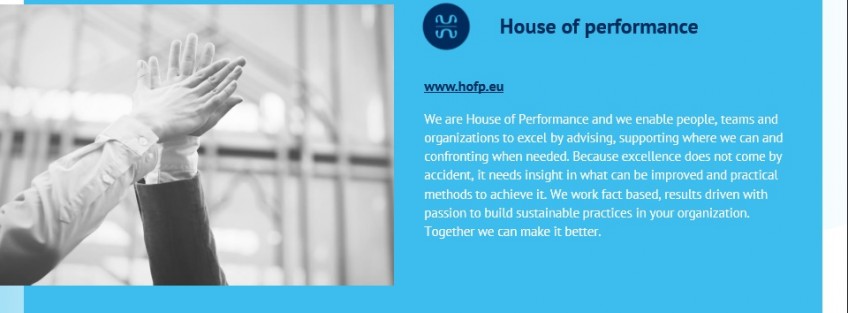Interview with Maarten Holland, Consultant, House of Performance
Thu | 24.08.2017
Other
1. Dear Maarten, please introduce yourself shortly to our members.
I am Maarten, one out of the 35 consultants working for House of Performance. Together with my colleague Carmel, I am happy to visit Romania in September, for a special event organized by the NRCC.
Carmel is working for House of Performance for over a year now, while I am working here for almost two years. Carmel goes for sustainable improvements. She doesn't like to write big reports, she starts doing it together with all levels of the organization. I love to challenge organizations, but also myself on how to improve. So why just limit this to the Dutch borders?
2. HofP is present also outside Europe. How is to work with other business cultures and what was the biggest challenge from this point of view?
Indeed, we’re not only present in Europe, but also in countries like Brasil and Indonesia. Every country is different, every culture is different. What is especially important to us is to prepare on these differences. A famous Dutch psychologist, Geert Hofstede, taught us to take 6 different dimensions into consideration when comparing our own Dutch culture to for instance the Indonesian one. This gives us some direction on how to interact with other cultures and to be aware of cross-cultural differences.
3. What about the Romanian market where you already started doing business. What was your first impression?
We love it so far! Our first project was in Iasi, for Zeelendia, proud member of the NRCC. Especially our way of working for all levels of the organization was really new to them. This really enabled people from different departments to communicate and better understand their needs. It’s very nice to notice the energy and the will to improve from all parties involved.
4. Let’s talk now about DATA, the „hot” topic you will approach minutely during the NRCC Knowledge Center on September 12. What are the main challenges here?
The biggest challenge on data is to really make an impact on the workfloor. This goes beyond just the insights from data, but also using it for your decision making.
Just the availability of data is not enough. Once this data is available and the organization has the capabilities, competences and also the will to use this data, one can become a ´High Potential´. The next step is to become a ´Data-driven Star’ by using the resources from business intelligence to create impactful insights and a real change readiness on the workfloor. This is really continuously improving using data.
5. We live in a fast changing world where, more than never, knowledge is one of the most powerful tools. How important is to be „a learning organisation”?
This is very important. Learning is about people. By a constant exchange of experiences, knowledge and ideas, their behavior continuously adjust. A learning organization develops the human potential in an organization and ensures a healthy connection with the outside world. Learning organizations recognize that, in their everyday life, there is always space to continuously improve efficiency and customer value while working simultaneously in the long run. A learning organization requires a delicate setup, the willingness to experiment and the will to learn from mistakes. At the same time, this form of organization may well be the best in the ever stronger and faster changing environment.
6. Speaking more about trends, gamification, the game-changer. How is this reshaping business in the Netherlands? What about other countries where HofP is operating?
We strongly believe that gamification is a game-changer. Using gamification we use different classic gaming principles in the real working environment. It starts at the target behavior. What behavior do you you want to change? And how could you make use of gamification to make this change happen?
As 70% of your personal development is done by practicing your work this is where you want to engage your workforce. When your people start to look at their work as a game, they tend to be motivated intrinsically by improving step by step. Using different techniques, we can increase our vallue added using less consultancy hours (by for instance the use of apps). And the power of gamification is that it is universal, usefull in different countries and cultures.
7. What main advice would you give to a Romanian company that wants to enter the Dutch market?
Learn how to ride a bike. Just kidding, but of course also the Dutch have their way of working. Be sure that you understand how the Dutch work and how for instance decision making is done. So try to get to know the market and the business you want to interact with. Not only business-wise, but also on a personal level.
8. What makes a great leader in your opinion?
One of our colleagues did her post doc on Lean Leadership. Her research shows that effective Lean leaders should be able to listen well to their employees. Both in meetings and in the workplace, this appears to be the most crucial behavior. The research shows that in addition to active listening, the following four core behaviors are shown more often by effective Lean middle managers as they work longer with Lean:
- building trust;
- support and actively encourage;
- facilitating learning by team members;
- give a good example.
9. And in the end, please a thought for the NRCC members.
Never stop improving! So join us for our workshop on the use of data to improve your organization.
2025
2024
-
November (1)
-
October (1)
-
July (1)
-
May (1)
-
March (1)
-
February (1)
-
January (1)
2023
-
November (1)
-
September (2)
-
August (2)
-
June (1)
-
May (1)
-
April (2)
-
March (1)
-
February (2)
-
January (2)
2022
-
December (3)
-
November (4)
-
October (3)
-
September (4)
-
August (3)
-
July (6)
-
June (4)
-
May (4)
-
April (8)
- Marketing News by diARK - April 2022
- Finance News by Mazars Romania - April 2022
- Experience the Perfect Chauffeur Transfer with David Intercar
- Mobility News by Business Lease - April 2022
- NRCC MEMBER IN SPOTLIGHT, WOLTERS KLUWER
- Crowe Romania and DeclaratiaUnica.ro engage in the automation of the single return form and the offering of personalized consultancy
- Cryptocurrency News by Bitcoin Romania, April 2022
- Legal News by BBW LAW - April 2022
-
March (6)
-
February (4)
-
January (5)
2021
-
December (3)
-
November (4)
-
October (2)
-
September (2)
-
August (1)
-
July (5)
-
June (3)
-
May (5)
-
April (4)
-
March (7)
- Cryptocurrency News by Bitcoin Romania, April 2021
- HR News by CNA International Executive Search Romania, March
- Real Estate News by CTP Invest, March 2021
- Sale-Purchase of Agricultural Land Located Outside Build-Up Areas
- MEET THE NRCC BOARD CANDIDATES 2021
- Fleet Management – Complete Makeover or Small Adjustments?
- Cryptocurrency News by Bitcoin Romania, March 2021
-
February (5)
-
January (6)
2020
-
December (2)
-
October (2)
-
September (3)
-
August (2)
-
July (6)
- NRCC Member in Spotlight Interview - Autonom
- Insolvency Proceedings: New Rules
- Member in Spotlight, UniCredit Bank
- Financing opportunities overview for large enterprises, SMEs and other organizations
- Companies: Simplification of Formalities
- Call for Leaders | What is your readiness score to benefit from the EU SURE initiative?
-
June (5)
-
May (8)
- The State of Alert. New rules for the collective proceedings
- The Retail Industry
- EU grants up to 6 Mil Euro for SME-s investment projects
- Member in spotlight, Heisterkamp Transportation Solutions
- State of Alert...What Is New
- The forced transformation of the automotive industry – Mazars analysis
- State of Alert in Romania
- Reducing the Impact of the Pandemic
-
April (6)
-
March (2)
2019
-
November (2)
-
July (1)
-
June (1)
-
March (2)
-
January (1)
2018
-
October (2)
-
September (1)
-
August (1)
-
July (3)
-
June (2)
-
May (1)
-
April (1)
-
March (3)
-
February (13)
- NRCC Elections 2018 - Elena Badea
- NRCC Elections 2018 - Loreda Dragomir
- NRCC Elections 2018 - Simina Fodor
- NRCC Elections 2018 - Manuel Herraiz Orti
- NRCC Elections 2018 - Tom Leene
- NRCC Elections 2018 - Mircea Moga
- NRCC Elections 2018 - Ronald Oort
- NRCC Elections 2018 - Razvan Pascu
- NRCC Elections 2018 - Alexandru Popescu
- NRCC Elections 2018 - Mihaela Tudor
- NRCC Elections 2018 - Loredana Van de Waart
- NRCC Elections 2018 - Edwin Warmerdam
- NRCC Elections 2018 - Philip Aarsman
2017
-
November (1)
-
September (1)
-
August (2)
-
May (1)
-
April (2)
-
March (1)
2016
-
November (1)
-
September (8)
-
June (1)
-
February (2)








